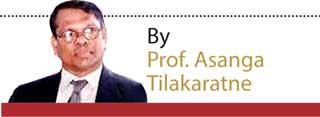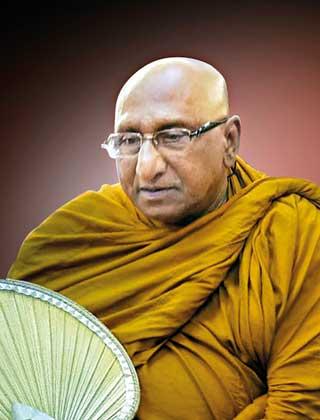Reply To:
Name - Reply Comment
One of the highlights of his Army service was to have been appointed the Commissioner for Rehabilitation of the participants of the 71 insurrection
The life of the late Venerable Ananda, both as a lay person and a member of the Sangha, was substantial, fruitful and memorable
 Former soldiers becoming Buddhist monks is not unheard of in the history of Sri Lanka. We have examples from the time of King Dutthagamani whose army fought successfully against invading foreign forces and some of them finally ending as Buddhist monks. But with the departure of the most Venerable Buddhangala Ananda Maha Thera, formerly, Major General Ananda Weerasekera, we are witnessing the end of a human being who combined his army discipline with that of the Buddhist monastic order and lived an exemplary life of virtue, concentration and wisdom (sila, Samadhi, panna). The monk passed away on December 28.
Former soldiers becoming Buddhist monks is not unheard of in the history of Sri Lanka. We have examples from the time of King Dutthagamani whose army fought successfully against invading foreign forces and some of them finally ending as Buddhist monks. But with the departure of the most Venerable Buddhangala Ananda Maha Thera, formerly, Major General Ananda Weerasekera, we are witnessing the end of a human being who combined his army discipline with that of the Buddhist monastic order and lived an exemplary life of virtue, concentration and wisdom (sila, Samadhi, panna). The monk passed away on December 28.
 Born in 1943, as the eldest in a family of six and having completed his school education at Nalanda Vidyalaya, Colombo, Ananda Weerasekera joined the army in 1964 as a junior officer and completed his distinguished career as a Major General, winning such honours as Uttama Sewa medal and Purna Bhumi medal on his way. One of the highlights of his army service was to have been appointed the Commissioner for Rehabilitation of the participants of the 71 insurrection. This was both a new experience in the recent political history of the country and a new experiment involving the harder path of reforming instead of punishing those who took arms against the state. Weerasekera accepted this challenge and completed his mission successfully.
Born in 1943, as the eldest in a family of six and having completed his school education at Nalanda Vidyalaya, Colombo, Ananda Weerasekera joined the army in 1964 as a junior officer and completed his distinguished career as a Major General, winning such honours as Uttama Sewa medal and Purna Bhumi medal on his way. One of the highlights of his army service was to have been appointed the Commissioner for Rehabilitation of the participants of the 71 insurrection. This was both a new experience in the recent political history of the country and a new experiment involving the harder path of reforming instead of punishing those who took arms against the state. Weerasekera accepted this challenge and completed his mission successfully.
There were two predominant concerns throughout in his life, they were: his country and his religion. The army career culminating as Major General is testimony for his love and service to the country. He served as the commanding officer of the North Central province at a point when the country was suffering badly due to separatist terrorism. He dedicated the most active phase of his life for the safeguard and integrity of the country.
Born into a Buddhist family of Mendis and Sumana Weerasekera and receiving his school education at Nalanda College, one of the leading Buddhist schools of the country, Weerasekera dedicated his life not merely for the protection and safeguard of the precious religious tradition of the country, but also, perhaps, even more importantly, for learning and the practice of this sublime teaching, which finally made him choose the monastic practice as his way of life. He obtained a special permission from the University of Kelaniya to follow Masters of Buddhist Studies at Postgraduate institute of Pali and Buddhist Studies (PGIPBS) and completed this course fulfilling his keen interest to acquire systematic knowledge in Buddhism which he inherited as his religion by birth.
He obtained a special permission from the University of Kelaniya to follow Masters of Buddhist Studies at Postgraduate institute of Pali and Buddhist Studies (PGIPBS) and completed this course fulfilling his keen interest to acquire systematic knowledge in Buddhism which he inherited as his religion by birth
This knowledge, no doubt, enabled him to engage in Buddhist activities with a sense of confidence. One such activity deserved to be recorded here is his service to the higher studies in Buddhism as a member of the Board of Management of PGIPBS. In 2004, as the then director of the institutes I invited him to join the highest administrative body of the institute, and he served a complete three year term (2004-2007) contributing to the wellbeing of the institute with his substantial knowledge and administrative experience. He was an ardent supporter of Damrivi Foundation, a Buddhist social organization for social, economic and spiritual development, of which his younger brother Rear Admiral Dr. Sarath Weerasekera, the Hon. Minister of Public Security of the country at present, among others, has been a founding member.
After a successful service to the security and wellbeing of the nation, Major General Weerasekera entered monkhood; fulfilling a long-cherished desire for a life of more serious practice and service and guidance from the Dhamma to those who needed it. He entered monkhood in 2007 at Buddhangala Forest Hermitage as a student of the Nayaka thera of the monastery and was conferred Full Admission – Upasampada – the following year, thus becoming a full member of the Sangha. Although his admission to the Sangha was described in the press (Sunday Observer, May 13, 2007 by Premasara Epasinghe) as “a very strange transition”, it was only very natural for Ven. Ananda who had cherished ideas of renunciation particularly after the demise of his beloved wife and mother of his children. The choice of the forest hermitage far away from the hustle and bustle of city life as his residence was in accordance with his inclination to live a life dedicated to practice in meditation, teaching and dissemination of the Dhamma.
Among practically dozens of writings on the Dhamma, one that attracted much attention and admiration of the readers was his translation into Sinhala of the life story of the Thai Buddhist nun ‘Silamata Chai’ who was believed to have attained the Arahanthood
Ven. Ananda had, from his early days, a great skill in oratory which he used very effectively as a forceful communicator. Although he had all the skills to be a popular preacher of the Dhamma, Ven. Ananda was selective when accepting invitations for sermons. He was happier to teach and guide those who visited Buddhangala monastery without disturbing his own peace and seclusion. I remember once he gave a memorable speech to the Buddhist Studies students of University of Colombo when I visited him with them at Buddhangala in one of the annual educational field trips. The Venerable was an equally forceful and clear communicator in writing. Among practically dozens of writings on the Dhamma, one that attracted much attention and admiration of the readers was his translation into Sinhala of the life story of the Thai Buddhist nun ‘Silamata Chai’ who was believed to have attained the Arahanthood.
The life of the late Venerable Ananda, both as a lay person and a member of the Sangha, was substantial, fruitful and memorable. This note coming from a junior friend, who had the privilege and honour of teaching him academic Buddhist studies, is necessarily incomplete, but only a humble tribute to him on behalf of all those who came into contact with him in particular in Buddhist related activities. May the late Venerable Buddhangala Ananda Thera attain the supreme bliss of Nibbana!
(The writer is the Chairman of the Damrivi Foundation)